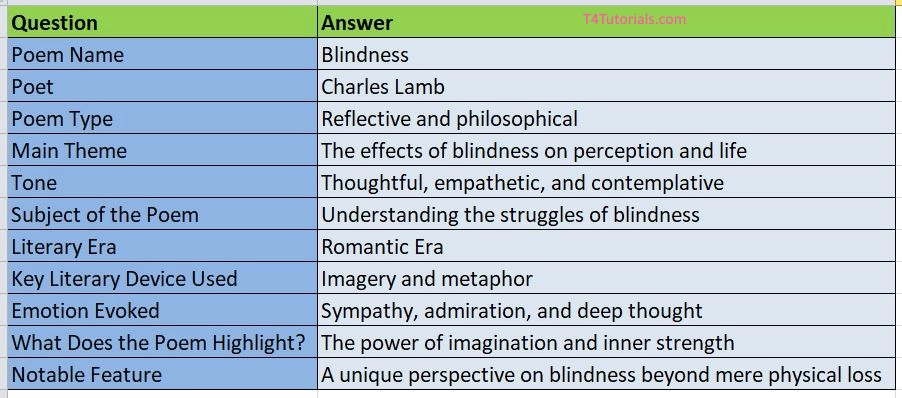Summary:
“Blindness” is a reflective poem by Charles Lamb that explores the theme of physical blindness and its emotional and philosophical implications. The poem delves into how blindness affects perception, memory, and imagination. Lamb portrays blindness not just as a physical limitation but also as a condition that alters one’s experience of the world. He reflects on the inner strength and resilience of those who suffer from blindness, highlighting their reliance on other senses and their ability to find beauty in non-visual ways. The poem conveys a deep sense of empathy and understanding.
10
Score: 0
Attempted: 0/10
Subscribe
| Question | Answer |
| Poem Name | Blindness |
| Poet | Charles Lamb |
| Poem Type | Reflective and philosophical |
| Main Theme | The effects of blindness on perception and life |
| Tone | Thoughtful, empathetic, and contemplative |
| Subject of the Poem | Understanding the struggles of blindness |
| Literary Era | Romantic Era |
| Key Literary Device Used | Imagery and metaphor |
| Emotion Evoked | Sympathy, admiration, and deep thought |
| What Does the Poem Highlight? | The power of imagination and inner strength |
| Notable Feature | A unique perspective on blindness beyond mere physical loss |
MCQs & Summary of Some Famous Poems by Charles Lamb
- The Old Familiar Faces – MCQs & Summary
- Hester – MCQs & Summary
- A Farewell to Tobacco – MCQs & Summary
- On an Infant Dying as Soon as It Was Born – MCQs & Summary
- The Grandame – MCQs & Summary
- Blindness – MCQs & Summary
- To Margaret W MCQs & Summary
Famous English Authors MCQs
- William Wordsworth MCQs
- William Shakespeare MCQs
- Robert Browning MCQs
- W B Yeats MCQs
- Edmund Spenser MCQs
- Chaucer MCQs
- John Milton MCQs
- S T Coleridge MCQs
- Lord Byron MCQs
- PB Shelley MCQs
- John Dryden MCQs
- John Keats MCQs
- Charles Dicken MCQs
- Alfred Lord Tennyson MCQs
- Charles Lamb MCQs
- D.H Lawrence MCQs
- Thomas Hardy MCQs
- Matthew Arnold MCQs
- John Galsworthy MCQs
- George Bernard Shaw MCQs
- T.S Eliot MCQs
- Ben Jonson MCQs
- Francis Bacon MCQs
- Alexander Pope MCQs
- Oliver Goldsmith MCQs
- Joseph Addison MCQs
- Dr Samuel Johnson MCQs
- Henry Fielding MCQs
- Sir Walter Scott MCQs
- Jane Austen MCQs
- Dr. Samuel Johnson MCQs
- English Comedy MCQs (Oliver Goldsmith)
- Alexander Pope MCQs (Neo-Classical Age of English Poetry)
- Daniel Defoe MCQs
- Dr. Jonathan Swift MCQs
- Richard Steele MCQs
- English Drama MCQs
- Elizabethan Drama MCQs [14th to 17th century]
- Elizabethan Prose MCQs
More English Literature MCQs
- English Poetry MCQs
- History of English Literature MCQs
- Sentimental Novels MCQs
- Sentimental Poetry MCQs
- Legends Of English Literature MCQs
- English Literature Quiz
- English Literature Important Multiple Choice Questions Answers
- Sons And Lovers by D H Lawrence MCQs
- The Waste Land, A Poem by T. S. Eliot MCQs
- Drama Origin MCQs
- History of the Renaissance Period MCQs
- English Pros MCQs
- Non-Dramtic Poets Of The Elizabethan Age MCQs
- The Cavalier Poets of 17th-century MCQs
- Metaphysical Poets of 17th century MCQs
- Renaissance Period of 14th, 15th, and 16th centuries MCQs
- Puritan Poet MCQs
- Restoration Comedy by William Congreve & Wycherley MCQs
- Satire MCQs – Renaissance Period by John Dryden
- English Essayists MCQs
- Romantic Period of Romantic Poets MCQs
- English language MCQs
- English Humour MCQs [American Literature]
- Early Writers of American Literature MCQs
- History of American Literature MCQs
- American Prose MCQs [English Realism ]
- American English Critics
- New Englanders Authors MCQs
- MCQs on American Literature After Independence
- American Playwrights MCQs
- New American Poetry MCQs
- British English Critics MCQs
- Ancient English literature MCQs
- Important English Literature MCQs for Public Service Commission
- English Literature Repeated Important MCQs
- CSS English Literature MCQs
- History of Early Period MCQs
- The Anglo-Saxon period MCQs
- The Age of Chaucer in the Early Period MCQs
- The Anglo-Norman Period of French Writers MCQs
- Metrical Romances MCQ (Anglo-Saxon Period)
- Revival of Learning MCQs (1400-1550)
- Applied Linguistics MCQs
- Language Change MCQs